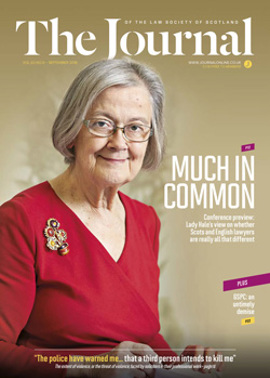Acting as notary: what do I need to know?

Solicitors who become notaries public are in a privileged position. The formality of notarial execution confers a higher standing on documents and entitles third parties to rely on them.
Before notarising a document, it is essential the notary has proof of the deponent’s identity. It is also essential the notary satisfies himself or herself that the deponent fully understands the document. However, it is not essential that the notary personally understands the document.
As outlined in Paterson and Ritchie’s Law, Practice and Conduct for Solicitors (2nd ed), at para 15.05.4: “the notary is not saying ‘I swear the contents of this document are true’ but is saying ‘I swear that the deponent is who he says he is and that he swore to me that the contents are true’”.
The execution of a deed before a notary is a longstanding practice that gives such documents a measure of legitimacy. The importance of ensuring the deponent understands the document should therefore be emphasised. Short documents should be read over and the deponent should be invited to formally acknowledge that they have read and understood the document. Unless the notary is fluent, documents in foreign languages must be accompanied by a certified translation. A notary should not act if there are any doubts about the capacity of the deponent to understand the document. There is also an element of common sense – a document that clearly contains gibberish is not capable of being understood and should not be notarised.
However, if the notary is satisfied that the deponent does understand the contents of the document, it is not a requirement for the notary to try to understand its terms.
Where a solicitor is instructed to notarise a document that he or she does not personally understand, it would be good practice for the solicitor to keep a file note outlining that he or she did not understand it, but that the client appeared to have capacity and that he or she swore before him or her that he or she understood it.
Establishing the proof of the identity of the deponent is just as important. Proof of identity consistent with money laundering standards should be seen and recorded. Often documents require the incorporation of a declaration by the notary that he/she is satisfied as to identity.
The manner of execution will depend on the jurisdiction and the type of deed, and members should refer to our guidance for information (Rules and Guidance, section F, division E).
In this issue
- Confidence restored: internal investigations and legal privilege
- Court reforms: still an unknown quantity
- Ruled out of court?
- Uncovering the environment (1)
- Medical death: a case to answer
- Reading for pleasure
- Opinion: Kerry Trewern and Rhona McNair
- Book reviews
- Profile: Ryan McCuaig
- President's column
- Developing digital services
- People on the move
- Leading judgment
- Health check
- Open to attack
- Claims: beating the trigger
- Storage: time for digital
- GSPC: eulogy for a friend
- Relevant persons: a challenge
- New specialist land registration practice launches
- Good enough reason?
- Copyright: underpinning control
- Writing means writing
- Rent moves: two crucial hoops
- Debtor wins in policy decision
- Scottish Solicitors' Discipline Tribunal
- KIR: the time bomb explodes
- The guideline goal
- GC NextGen: a network for you?
- Your Law Society of Scotland Council members
- Public policy highlights
- Double boost for Society's AML team
- Ask Ash
- Practice rights and the impact of Brexit: working in the EU
- Acting as notary: what do I need to know?
- Engagement letters: a practical approach
- Uncovering the environment
- Paralegal pointers






